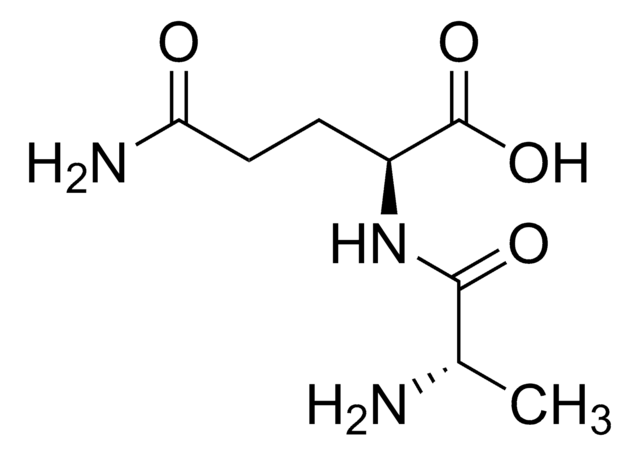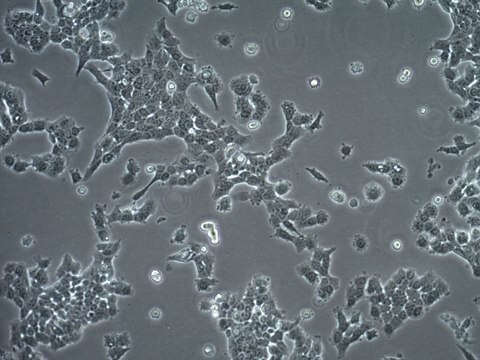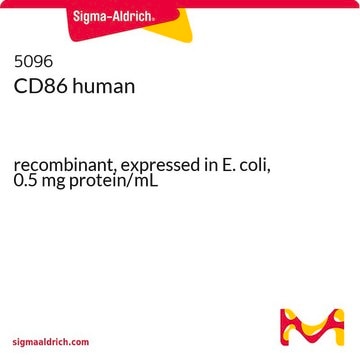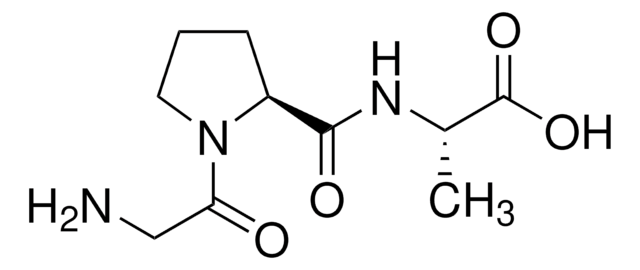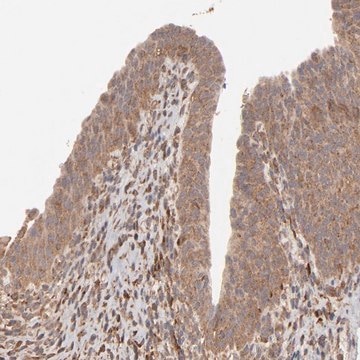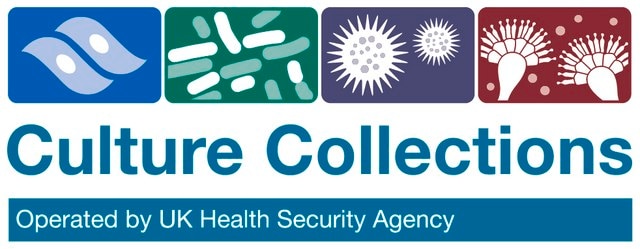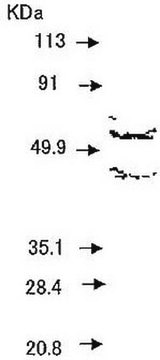SCC139M
PMC42-LA Human Breast Cancer Cell Line
Human
Synonym(s):
PMC42LA Cell Line
Sign Into View Organizational & Contract Pricing
All Photos(1)
About This Item
UNSPSC Code:
41106514
eCl@ss:
32011203
NACRES:
NA.81
Recommended Products
product name
PMC42-LA Human Breast Cancer Cell Line, PMC42-LA human breast cancer cell line is a mammary epithelial cell model that can be used to study epithelial to mesenchymal transition.
biological source
human
Quality Level
technique(s)
cell culture | mammalian: suitable
General description
Human breast carcinoma cell lines are useful models to investigate the pathogenesis of neoplastic transformation and aid in the development of novel therapeutic strategies. Nonetheless, there are few well characterized cell lines derived from human mammary carcinomas and loss of breast-specific marker expression and the emergence of dedifferentiated phenotypes over extended culture often limit their use .
Initiated from a pleural effusion of a metastatic breast cancer patient, the human mesenchymal breast carcinoma cell line PMC42 (also known as PMC42ET), is unique in that these cells remained pleomorphic even after several years of sustained culture . Typically grown in monolayer, PMC42 continue to give rise to numerous morphologically different cell types of both secretory and myoepithelial characteristics and this retained ability to differentiate in vitro earned their designation as stem cell like .
Initiated from a pleural effusion of a metastatic breast cancer patient, the human mesenchymal breast carcinoma cell line PMC42 (also known as PMC42ET), is unique in that these cells remained pleomorphic even after several years of sustained culture . Typically grown in monolayer, PMC42 continue to give rise to numerous morphologically different cell types of both secretory and myoepithelial characteristics and this retained ability to differentiate in vitro earned their designation as stem cell like .
PMC42-LA is a stable epithelial variant of the mesenchyme-like parental PMC42 /PMC42-ET cell line. PMC42-LA congregate into pavement epithelial sheets at high density, in which the cell-cell borders contain E-cadherin and -catenin, albeit 5-10% of cells do express the mesenchymal marker vimentin. When stimulated with epidermal growth factor (EGF), PMC42-LA cells undergo an epithelial-mesenchymal transition in which vimentin expression is upregulated and E-cadherin expression is reduced .
Cell Line Description
Cancer Cells
Application
Research Category
Cancer
Oncology
Cancer
Oncology
This product is intended for sale and sold solely to academic institutions for internal academic research use per the terms of the “Academic Use Agreement” as detailed in the product documentation. For information regarding any other use, please contact licensing@emdmillipore.com.
Quality
• Each vial contains ≥ 1X106 viable cells.
• Cells are tested by PCR and are negative for HPV-16, HPV-18, Hepatitis A, C, and HIV-1 & 2 viruses.
• Cells are negative for mycoplasma contamination.
• Each lot of cells is genotyped by STR analysis to verify the unique identity of the cell line.
• Cells are tested by PCR and are negative for HPV-16, HPV-18, Hepatitis A, C, and HIV-1 & 2 viruses.
• Cells are negative for mycoplasma contamination.
• Each lot of cells is genotyped by STR analysis to verify the unique identity of the cell line.
Storage and Stability
Store in liquid nitrogen. The cells can be cultured for at least 10 passages after initial thawing without significantly affecting the cell marker expression and functionality.
Disclaimer
Unless otherwise stated in our catalog or other company documentation accompanying the product(s), our products are intended for research use only and are not to be used for any other purpose, which includes but is not limited to, unauthorized commercial uses, in vitro diagnostic uses, ex vivo or in vivo therapeutic uses or any type of consumption or application to humans or animals.
wgk_germany
WGK 1
flash_point_f
Not applicable
flash_point_c
Not applicable
Certificates of Analysis (COA)
Search for Certificates of Analysis (COA) by entering the products Lot/Batch Number. Lot and Batch Numbers can be found on a product’s label following the words ‘Lot’ or ‘Batch’.
Already Own This Product?
Find documentation for the products that you have recently purchased in the Document Library.
R H Whitehead et al.
Journal of the National Cancer Institute, 71(6), 1193-1203 (1983-12-01)
A new human breast carcinoma cell line (PMC42) has been further characterized. The cells can grow either as monolayers or as floating cords of cells. The cords grow in suspension for long periods but may spontaneously attach and grow out
Margaret L Ackland et al.
Laboratory investigation; a journal of technical methods and pathology, 83(3), 435-448 (2003-03-22)
PMC42-LA cells display an epithelial phenotype: the cells congregate into pavement epithelial sheets in which E-cadherin and beta-catenin are localized at cell-cell borders. They abundantly express cytokeratins, although 5% to 10% of the cells also express the mesenchymal marker vimentin.
L W Engel et al.
Cancer research, 38(11 Pt 2), 4327-4339 (1978-11-01)
A comprehensive listing of putative human breast carcinoma cell lines and the extent to which each has been characterized is presented. Criteria used to certify the human, mammary, and malignant origin of a cell line include: (a) a reliable histopathological
Our team of scientists has experience in all areas of research including Life Science, Material Science, Chemical Synthesis, Chromatography, Analytical and many others.
Contact Technical Service